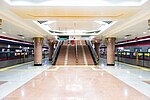Tiananmen
15th-century establishments in China1650s establishments in ChinaBuildings and structures completed in 1420Buildings and structures completed in 1651Dongcheng District, Beijing ... and 7 more
Forbidden CityGates of BeijingMajor National Historical and Cultural Sites in BeijingMing dynasty architectureNational symbols of the People's Republic of ChinaQing dynasty architectureTiananmen Square

The Tiananmen (also Tian'anmen (天安门), Tienanmen, T’ien-an Men; [tʰjɛ́n.án.mə̌n]), or the Gate of Heaven-Sent Pacification, is a monumental gate in the city center of Beijing, China, the front gate of the Imperial City of Beijing, located near the city's Central Business District, and widely used as a national symbol. First built during the Ming dynasty in 1420, Tiananmen was the entrance to the Imperial City, within which the Forbidden City was located. Tiananmen is located to the north of Tiananmen Square, and is separated from the plaza by Chang'an Avenue.
Excerpt from the Wikipedia article Tiananmen (License: CC BY-SA 3.0, Authors, Images).Tiananmen
West Chang'an Street, Beijing Donghuamen
Geographical coordinates (GPS) Address External links Nearby Places Show on map
Geographical coordinates (GPS)
| Latitude | Longitude |
|---|---|
| N 39.907333333333 ° | E 116.39108333333 ° |
Address
天安门
West Chang'an Street 1
100010 Beijing, Donghuamen
Beijing, China
Open on Google Maps








